Health
New dementia drug ‘has given me hope’: Alzheimer’s patients reveal their stories
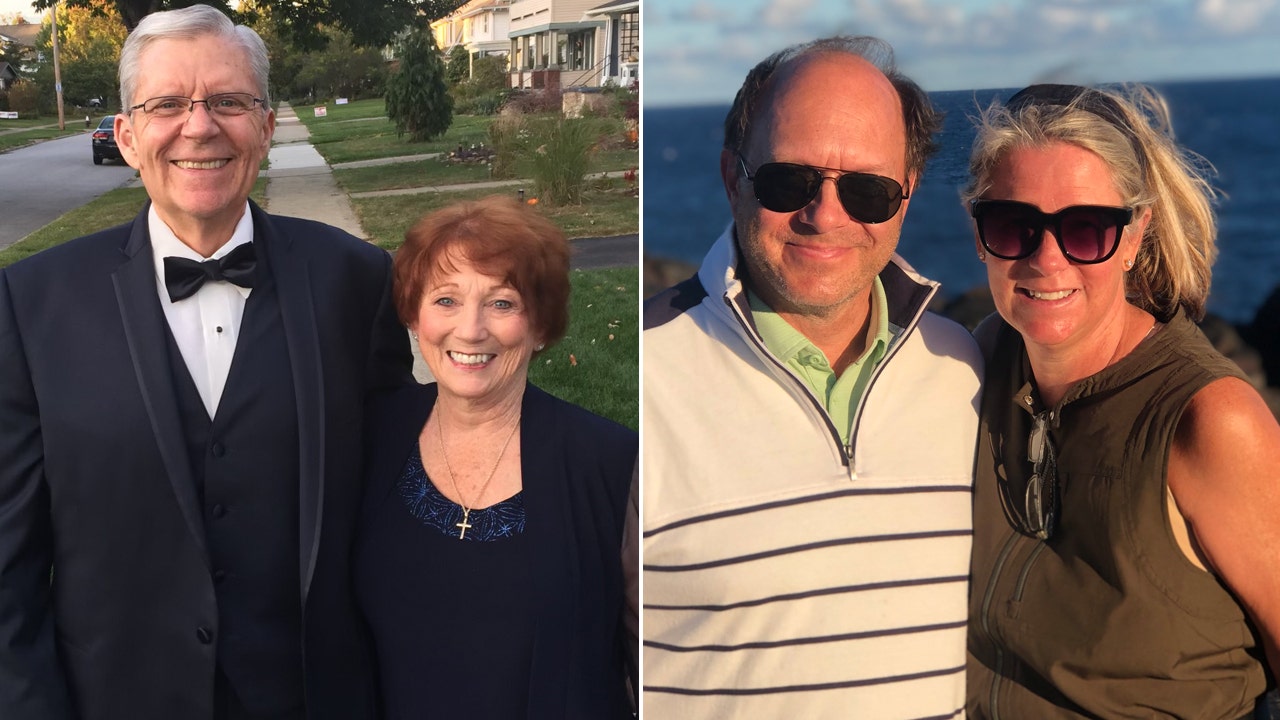
The first new Alzheimer’s treatment in 20 years was given full FDA approval earlier this month — and now two patients who participated in the clinical trials have spoken about their personal experience with the drug to Fox News Digital.
Lecanemab, sold under the brand name Leqembi, works by reducing amyloid plaques in the brain, which is one of the hallmarks of Alzheimer’s.
In early trials, the drug was shown to slow cognitive decline by 27%.
FDA FULLY APPROVES ‘NOVEL’ ALZHEIMER’S DISEASE DRUG LEQEMBI, WILL BE COVERED BY MEDICARE
Two Ohio patients who participated in the trials recently spoke to Fox News Digital about how Leqembi has impacted their Alzheimer’s journeys — and changed their lives.
Joan Murtaugh’s story: ‘It’s not a miracle, but it’s gradual progress’
Joan Murtaugh, 77, lives in Lakewood, Ohio, with her husband, Larry.
She first started noticing memory problems nearly seven years ago, just after her 70th birthday.
“Timing is everything,” her husband, Larry Murtaugh, told Fox News Digital in an interview. “It was Joan who made an appointment at the brain center clinic.”
In 2017, Murtaugh was diagnosed with mild cognitive impairment.
The next year, after having a 3-D MRI and spinal tap, she learned that she had an enzyme in her spinal fluid that predicted a 65% chance of getting Alzheimer’s in her lifetime.
Two Ohio patients who participated in the trials spoke to Fox News Digital about how Leqembi has impacted their Alzheimer’s journeys. On the left, patient Joan Murtaugh is pictured with husband Larry Murtaugh; on the right, patient John Domeck is shown with wife Ann Domeck. (Joan & Larry Murtaugh/John & Ann Domeck)
In February 2020, Murtaugh received some good news: She was eligible to participate in a double-blind study trial for a new drug, Leqembi, at Cleveland Clinic in Ohio.
“I assume it was because it was obvious there was some plaque in my brain, which they realized was causing Alzheimer’s,” Murtaugh told Fox News Digital.
This was Phase 3 of the clinical trial, which included some 1,800 people worldwide. Murtaugh was one of only eight people to receive the drug at Cleveland Clinic.
“I am fully functional — I’m still doing everything I always did.”
A few months later, she began getting twice-monthly infusions of what was either a drug or a placebo.
ALZHEIMER’S DISEASE IS MOST COMMON IN THESE US COUNTIES, NEW STUDY FINDS
To this day, Murtaugh still doesn’t know if she was getting the real thing or a placebo — she won’t find out until the very last person has received the very last dose of the double-blind study. Yet she said she “has a hunch.”
“I am fully functional — I’m still doing everything I always did,” Murtaugh said.
“I can still drive my car, shop, garden, cook, read — all those things.”
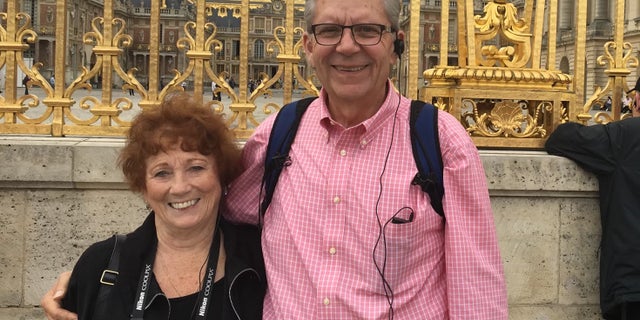
“Timing is everything,” husband Larry Murtaugh told Fox News Digital in an interview about the Alzheimer’s diagnosis of his wife, Joan Murtaugh. (Joan & Larry Murtaugh)
Throughout the entire trial period, Murtaugh said she never got any worse. She just experienced the same mild symptoms she’d had before starting the drug — and she may have even improved a bit.
Although Leqembi has been linked to some potential side effects, she experienced none.
“When you first hear the word ‘Alzheimer’s,’ a chill goes through you — it’s like you’re looking into a dark abyss,” Murtaugh said.
“But this new drug offers great hope.”
VISION PROBLEMS COULD MEAN HIGHER DEMENTIA RISK, STUDY FINDS: ‘EYE HEALTH AND BRAIN HEALTH ARE CLOSELY LINKED’
In September 2021, the trial portion of the study ended and Murtaugh was eligible to start receiving the actual medication, which she still takes today.
Instead of the lengthy infusions, she now gets the medication via an EpiPen injection once a week with the help of her husband.
The drug is currently covered by Medicare, which means Murtaugh gets it for free — and she hopes that will continue for the foreseeable future.
While the Murtaughs realize that the future may bring challenges, they regard Leqembi as “a ray of sunshine in a very cloudy sky.”
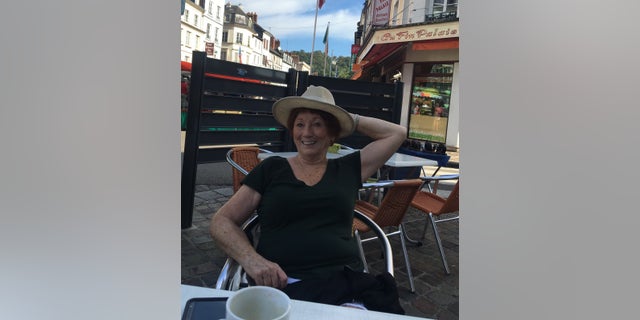
Throughout the entire trial period, Joan Murtaugh, shown here, said she never got any worse; she said she just experienced the same mild symptoms she’d had before starting the drug. (Joan Murtaugh)
Paired with other approaches such as cognitive speech therapy, they’re optimistic that the drug will continue to keep Alzheimer’s symptoms at bay.
“We’re not going to declare victory, but we’re on the right path and we have the right team at Cleveland Clinic,” said Larry Murtaugh.
“It’s not a miracle, but it’s gradual progress.”
John Domeck’s story: ‘I thank God every day’
A retired attorney in Aurora, Ohio, John Domeck was just 57 years old when he was diagnosed with Alzheimer’s.
The people around him — his colleagues at the law office and his family at home — started noticing his memory lapses before he did.
After 30 years of never having to take many notes at work, Domeck, now 61, had started to write things down to avoid forgetting them.
“Alzheimer’s kind of rocked our world, and this drug rocked it back a little bit the other way.”
“Over time, I wasn’t able to continue doing as much work as quickly as I once did,” he told Fox News Digital during an interview.
His wife of 40 years, Ann Domeck, had also started noticing some red flags at home, but said the last thing they expected was Alzheimer’s disease.
The Domecks made an appointment at Cleveland Clinic for some cognitive testing, which led to a spinal tap and, ultimately, an Alzheimer’s diagnosis in July 2019.
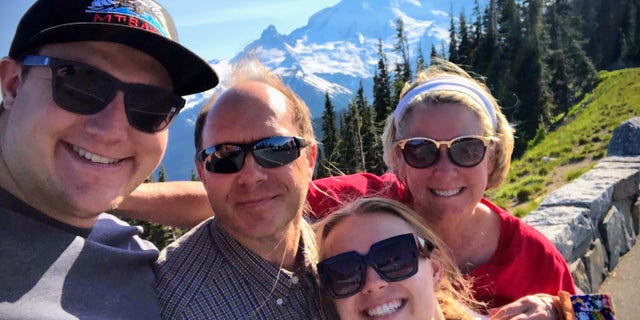
John Domeck, a retired attorney in Aurora, Ohio (second from left), was just 57 when he was diagnosed with Alzheimer’s. He’s pictured here with his family. (John & Ann Domeck)
Domeck’s wife, a TV news producer in Cleveland, left her job to help care for her husband.
Given Domeck’s young age and early-stage decline, a Cleveland Clinic doctor told him he was the perfect candidate for a clinical trial for a new Alzheimer’s drug.
For 18 months, Domeck went in for twice-monthly infusions, which lasted up to six hours per session — without knowing whether he was getting the drug or the placebo.
A year ago, he was switched to the “open-label” Leqembi medication, which he takes via injection at home once a week.
SURPRISING BRAIN BOOST: BRUSHING YOUR TEETH MAY REDUCE THE RISK OF DEMENTIA, NEW STUDY SUGGESTS
The Domecks suspect that John has been on the drug the entire time, as he has not declined much at all in the past four years.
“Everyone’s like, he had to have been getting it before — he’s doing so well,” Ann Domeck said. “His cognitive deficits have only increased minimally. After four years of Alzheimer’s, his scores should be a lot lower.”
“The fact that he’s still able to maintain his day-to-day activities and do the things that he enjoys is just so promising,” she added.
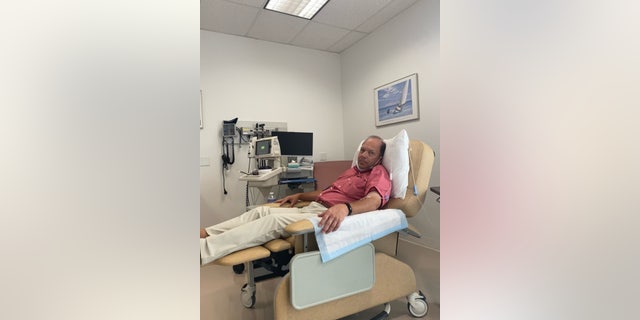
John Domeck is pictured here getting an infusion of either the Alzheimer’s drug or the placebo during the clinical trial. (John Domeck)
“John gets up and drives and golfs and reads every day,” she said. “He got to see our son get married, and we’re planning to visit our daughter in Europe.”
Throughout the process, the Domecks said they have been “astounded” by the compassion and support of their care team at Cleveland Clinic.
“They’re professionals, and they know their stuff about Alzheimer’s, but they’re also some of the nicest people we’ve ever met,” Ann Domeck said.
While the couple understand that Leqembi is not a cure, they’re more optimistic now than they were a few years ago.
“Taking this drug is a long-term commitment.”
“Alzheimer’s kind of rocked our world, and this drug kind of rocked it back a little bit the other way,” said Ann Domeck.
After initially being “shell-shocked” by the unexpected diagnosis, the Domecks feel that the drug has given them time they were told not to expect.
“I thank God every day that we got in this trial,” Ann Domeck said. “It’s the best thing that’s happened to us.”
What to know about Leqembi
While it’s the first Alzheimer’s drug to receive full FDA approval in 20 years, Leqembi is also the first medication to target the underlying disease and not just the symptoms, explained Dylan Wint, M.D., director of the Cleveland Clinic Lou Ruvo Center for Brain Health in Las Vegas, Nevada.
Leqembi is approved only for the treatment of mild cognitive impairment or early-stage Alzheimer’s for people who have been shown to have amyloid plaques in the brain.
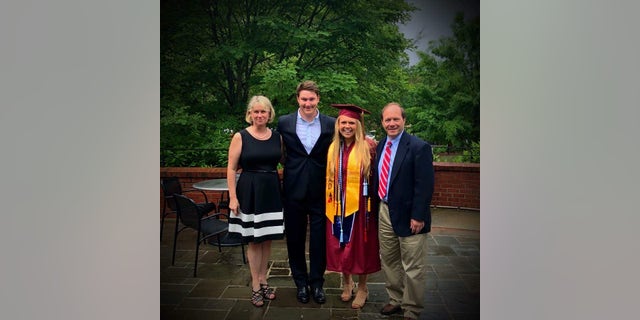
John Domeck (far right) is pictured with his family at his daughter’s college graduation. Throughout the whole process, the Domecks said they have been “astounded” by the compassion and support of their care team at Cleveland Clinic. (John & Ann Domeck)
“Lecanemab labels abnormal amyloid and tells the immune cells to remove those fibers from the brain,” Wint told Fox News Digital.
In testing, about two-thirds of patients went from amyloid positive to amyloid negative — and cognitive and functional decline was 27% slower for study participants compared to those on placebo, the doctor said.
AI GIVES DOCTORS PERSONALIZED TREATMENT PLANS FOR DEMENTIA PATIENTS
“Taking this drug is a long-term commitment,” said Wint. “Doctors need to make sure the patient can tolerate this rigorous regimen — intravenous infusions every two weeks for 18 months, interspersed with MRI scans and memory testing.”
More care and support are needed for people with moderate and severe Alzheimer’s disease and their families, not to mention people with other forms of dementia, he added.
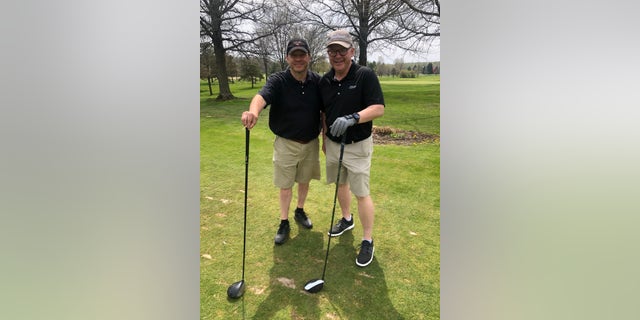
The new Alzheimer’s drug has enabled John Domeck (above left) to continue to participate in the activities he enjoys. (John Domeck)
As with any medication, lecanemab can have some side effects.
Most commonly, it can cause various brain reactions, like swelling and bleeding, explained Manisha Parulekar, M.D., co-director of Hackensack University Medical Center’s Center for Memory Loss & Brain Health in New Jersey.
“Patients will have to stop the medication if these changes are noted on MRIs,” Parulekar told Fox News Digital. “People who are taking multiple blood thinners will not be able to take Leqembi.”
Headaches and confusion are also commonly reported.
CLICK HERE TO SIGN UP FOR OUR HEALTH NEWSLETTER
Now that Leqembi is fully approved, Medicare will cover the medication, with other insurance companies likely to follow, said Parulekar.
“Without Medicare or insurance, the out-of-pocket costs are around $26,000 per year,” she noted.
Alzheimer’s disease involves many complex factors, Wint noted, and the new medication targets just one factor: amyloid.
“While this new approach is excellent news, removing amyloid is not a cure,” he said.
“We still need to find better symptomatic and disease-modifying treatments in the future.”
Leqembi is most effective when combined with existing treatments, said Wint, including symptomatic medicines, rehabilitation and family support.

Health
The Oatzempic Diet Is Going Viral, but Does It Work? Here’s How To Tap Real Weight Loss Benefits

Sign Up
Create a free account to access exclusive content, play games, solve puzzles, test your pop-culture knowledge and receive special offers.
Already have an account? Login
Forgot your password?
Get back to the Sign In
Use left and right arrow keys to navigate between menu items.
Use escape to exit the menu.
Health
Grieving during Mother’s Day: 5 tips for navigating the first holiday after losing a mom
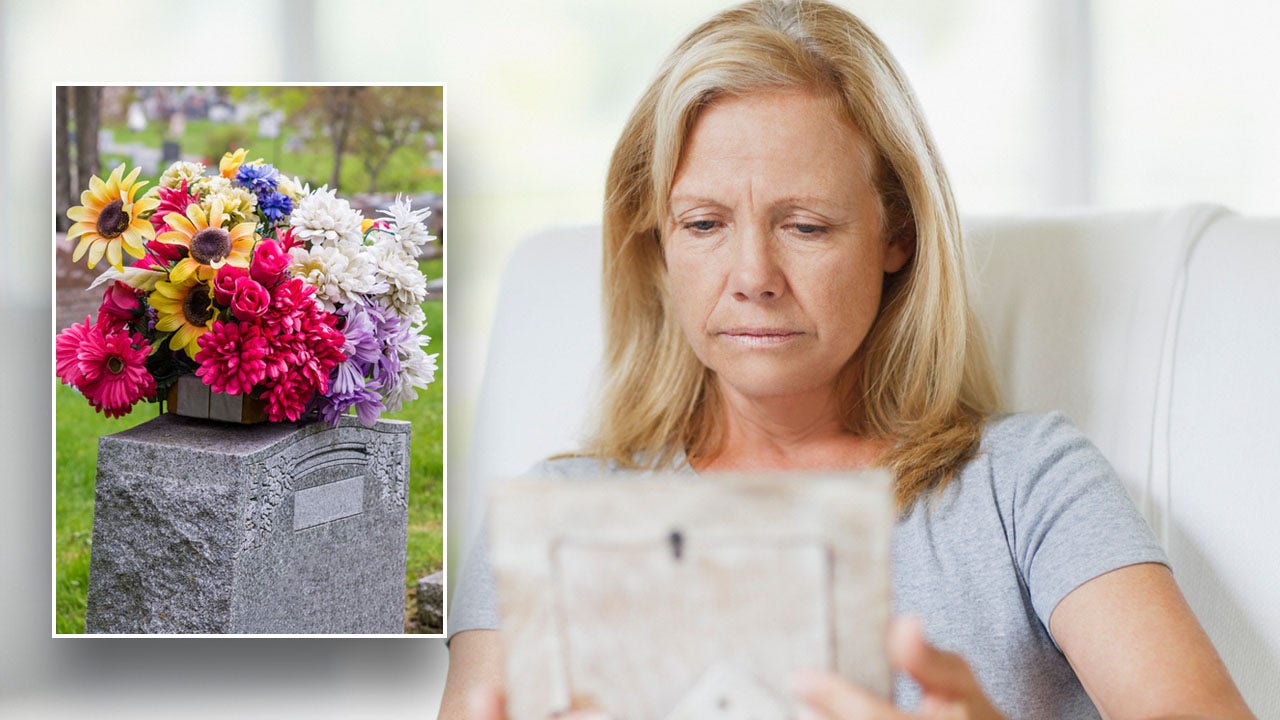
Mother’s Day is a celebration for most. Yet for those who have lost their moms, it can be a difficult day marked by grief and isolation.
“The first year after any loss can be awful, but the holidays stand out in particular,” noted Rebecca Feinglos, a certified grief support specialist in North Carolina and founder of Grieve Leave, an online community to support grievers.
“Your first Mother’s Day after the death of your mom can make her absence feel even more real. It’s a stark reminder of the permanence of the loss.”
3 SURPRISING LESSONS AFTER LOSING A SPOUSE AND TRYING TO MOVE FORWARD IN LIFE: ‘STILL EVOLVING’
For those who had a close bond with their mother, Feinglos said the absence can feel like a “gaping hole” in their everyday lives.
“And for those whose relationships with their mothers were less than ideal, Mother’s Day can bring up a whole different set of emotions,” she said.
For those who have lost their mothers, Mother’s Day can be a difficult day to manage. A certified grief support specialist (not pictured) shares insights and help for coping. (iStock)
“There may be a mix of grief for the relationship they never had, along with anger or resentment over past hurts.”
“The key is to be intentional about how you want to spend the day.”
It doesn’t help that Mother’s Day is a highly publicized holiday with such an emphasis on the mother-child relationship, Feinglos said.
“Everywhere you turn, there are advertisements, social media posts and conversations centered around celebrating mothers,” she said.
MOTHERS SHARE STORIES OF THEIR LIVES, PLUS TIPS AND INSPIRATION, IN ‘LOVE, MOM’ BY DR. NICOLE SAPHIER
“For those who have recently lost their mom, this constant barrage of Mother’s Day messaging can feel like salt in the wound, regardless of the circumstances of their relationship.”

“For those who have recently lost their mom, [the] constant barrage of Mother’s Day messaging can feel like salt in the wound, regardless of the circumstances of their relationship,” an expert said. (iStock)
For those who are approaching their first Mother’s Day after losing a mom, Feinglos offered five tips for navigating the difficult emotions.
1. Make a plan
“Trust me, you don’t want to wake up on your first motherless Mother’s Day with no idea of how to spend the day,” Feinglos said.
“That’s a recipe for a major grief spiral and for potentially doom-scrolling other people’s ‘Happy Mother’s Day’ posts.”
The expert recommends thinking in advance about what you might want your day to look like — and then planning for it.
HOLIDAY GRIEF CAN BE HANDLED IN THESE 9 WAYS, ACCORDING TO MENTAL HEALTH EXPERTS
“It doesn’t have to be anything fancy. Maybe it’s watching your mom’s favorite movies on Netflix, ordering her favorite takeout, or going for a hike on a trail you used to walk together,” she said.
“The key is to be intentional about how you want to spend the day.”

“The first year after any loss can be awful, but the holidays stand out in particular,” a grief expert noted. (iStock)
If you do decide to venture out, Feinglos said, it’s important to be prepared for Mother’s Day-focused events, including restaurant menu specials.
“If that feels like too much to handle, consider having an at-home dinner plan instead,” she suggested.
2. Reach out to others
Grief can be isolating, Feinglos said, and it’s easy to feel like you’re the only one in the world who has ever felt this way.
“But when you’re open and willing to ask for help, you might be surprised by how much better you’ll feel just saying that you’re having a tough time,” she said.
“Your first Mother’s Day after the death of your mom can make her absence feel even more real.”
If you’re feeling overwhelmed or just need someone to talk to, Feinglos said to take the initiative in reaching out, rather than waiting for someone to contact you.
“Pick up the phone, send a text or even just post on social media about how you’re feeling,” she suggested.

Those who are grieving should reach out to family and friends for support, an expert advised. (iStock)
“I have a feeling that your community will be ready and willing to offer their support.”
3. Let people support you
Those who are grieving may be afraid that they’re a burden on friends and loved ones, Feinglos noted.
“But here’s the thing: The people who care about you want to be there for you,” she said.
MOTHER’S DAY: THE BEST ONE-LINERS AND LIFE ADVICE I’VE EVER GOTTEN FROM MOM
“So, when your best friend offers to come over on Mother’s Day and hang out, or your sibling suggests a family Zoom call, say yes. Letting others show up for you can make the day feel a little less overwhelming.”
4. Create a ritual to make space for your grief
One of the most meaningful things you can do on Mother’s Day, according to Feinglos, is to “intentionally create a ritual that makes space for your grief.”

Journaling or writing a letter to your late mother is one way to process your feelings on Mother’s Day. (iStock)
“That could mean writing your late mother a letter and burning it or casting it into a body of water, visiting a place that was special to both of you, listening to her favorite music — or doing something that reflects her values and passions,” she said.
The idea is to do something intentional that helps you feel connected to your mom, even though she’s not physically there, the expert said.
“By creating space for your grief, you’re giving yourself permission to feel all the complicated emotions that come with loss.”
“Your relationship with your person can continue even when they’ve died,” Feinglos said.
GRATITUDE OVERSHADOWS GREAT LOSS, SAYS AUTHOR OF BOOK ABOUT LOSING WIFE TO CANCER
“By creating space for your grief, you’re giving yourself permission to feel all the complicated emotions that come with loss.”
5. Know that there are different shades of grief
Grief doesn’t follow any rules or timelines, Feinglos said — and it can look completely different from one person to the next, especially because every bond is unique.
“There’s no one ‘normal’ way grief plays out,” she said.
“For some, it might hit like a tsunami of tears, especially on gut-punch days like Mother’s Day.”
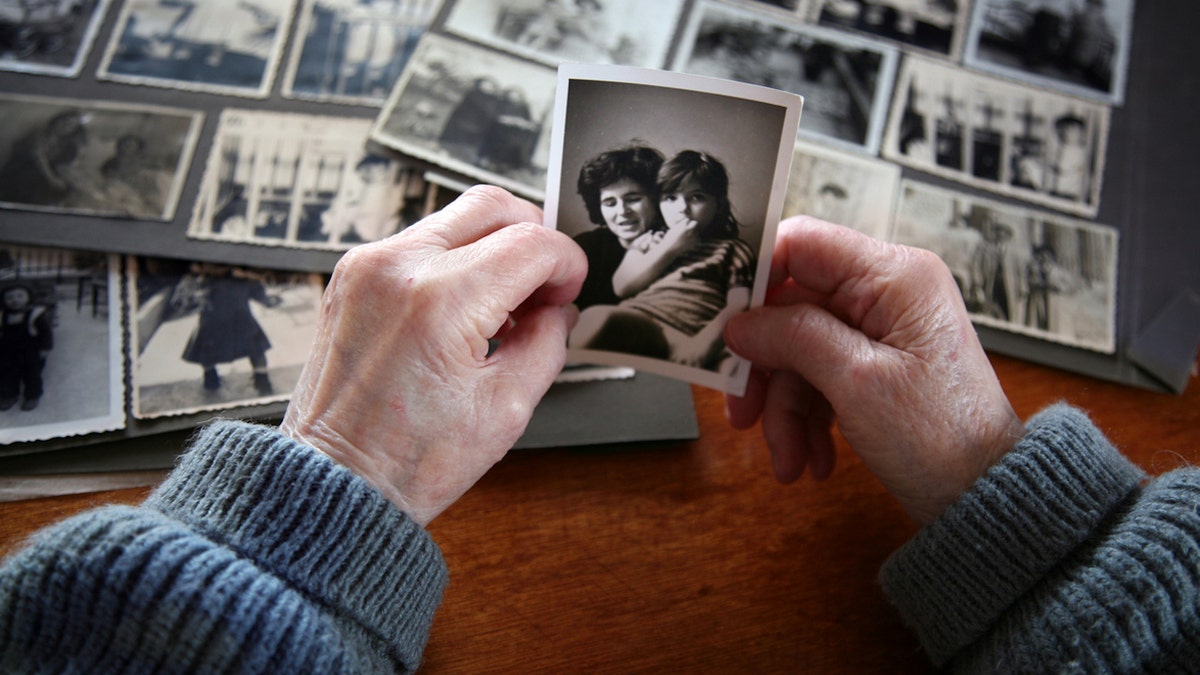
It’s important not to suppress or ignore feelings of grief on Mother’s Day, a mental health expert said. (iStock)
“Maybe you vacillate between being present one moment and feeling utterly numb the next, laughing through tears one day and feeling bitter anger the next.”
On a day like Mother’s Day, Feinglos said, you might find that your thoughts loop back to your loved one regularly, or you could tend to avoid anything that could stir up memories.
CLICK HERE TO SIGN UP FOR OUR HEALTH NEWSLETTER
Whatever way your grief manifests, Feinglos emphasized the importance of not trying to suppress or ignore it.

“At its core, grief underscores one truth: You’re alive, you’re human, and you’re going through a loss,” an expert said. (iStock)
“When we disregard our grief, it can pop back up in ways that are really inconvenient, or even scary — like lashing out at loved ones, feeling hopeless or [engaging in] risky behaviors,” she told Fox News Digital.
“Give yourself the space and time to relearn what your life is like now with this loss in mind,” she continued.
“At its core, grief underscores one truth: You’re alive, you’re human, and you’re going through a loss.”
For more Health articles, visit www.foxnews.com/health.
Health
Struggling to fall asleep? Try this simple trick to drift off quickly

For those who are struggling to get enough sleep, the ABCs may be the key to getting more Zzzs.
A sleep shortcut that’s making the rounds on TikTok uses the alphabet to help people drift off.
Sleep experts shared their input on the unconventional route to restful nights.
HAVING TROUBLE SLEEPING? IT COULD BE FOR THIS SURPRISING REASON, EXPERTS SAY
The technique isn’t new, but it’s been circulating on social media in recent weeks.
Here’s how it works: The wanna-be sleeper chooses a category — whether it’s song titles, vacation destinations or anything that strikes their fancy — and then thinks of something for every letter of the alphabet.
A sleep shortcut that’s making the rounds on TikTok uses the alphabet to help people drift off. (iStock)
For instance, if the category is colors, A might be Aqua, B could be Blue, C could be Chartreuse, and so on.
The idea is that, over time, the exercise will lull the person to sleep.
There are other variations of the alphabet hack, such as picturing each letter being written and erased to help induce sleep.
AMERICANS NEED MORE SLEEP, LESS STRESS, EXPERTS SAY, AS GALLUP POLL REVEALS TROUBLING FINDINGS
Sleep expert Jeff Kahn, the Chicago-based CEO and co-founder of Rise Science, maker of the sleep and energy tracker app RISE, pointed out that the alphabet method hasn’t been studied, but that it likely works by distracting the person from focusing on the inability to sleep.
“This is how the larger category of distraction techniques can help with sleep, anxiety and managing pain, among other challenges,” he told Fox News Digital.
“You can’t force sleep — and thinking about falling asleep or about how you can’t fall asleep is a surefire way to delay it.”

If lack of sleep is interfering with your quality of life, experts recommend speaking with a doctor about getting assessed for a sleep disorder or other underlying medical conditions. (iStock)
Dr. Chelsie Rohrscheib, a neuroscientist and sleep specialist at Wesper in New York, noted that many people experience an overactive mind when they’re trying to sleep, which makes it difficult for the brain and body to relax — leading to insomnia and poor sleep quality.
“The alphabet hack forces you to stop focusing on stimulating or stressful thoughts, which calms your brain activity and helps the brain enter the first sleep stage,” she told Fox News Digital.
Alternative sleep hacks
If the alphabet method doesn’t work, there are other creative techniques that could help you fall asleep.
“Alternatives include meditation and deep breathing exercises, which focus on not only quieting the mind, but also slowing your heart rate and breathing, which make it easier to enter sleep,” Rohr said.
“You can’t force sleep — and thinking about falling asleep is a surefire way to delay it.”
If none of these techniques are effective, he recommends getting out of bed and going to another quiet, dim area to do a relaxing activity, like reading or listening to music, until you feel sleepy.
Kahn agreed with that advice.

“You can’t force sleep — and thinking about falling asleep or about how you can’t fall asleep is a surefire way to delay it,” an expert said. (iStock)
“A good rule of thumb is, if you can’t fall asleep within 20 to 30 minutes, abandon the pursuit, leave your bed, and do things that are relaxing and distracting, in low or as little light as possible,” he advised.
“Let sleepiness wash over you, which it will, and then head back to bed. Sleep doctors call this a ‘sleep reset.’”
Another technique that works for a lot of people is progressive muscle tension and relaxation, both experts said.
CLICK HERE TO SIGN UP FOR OUR HEALTH NEWSLETTER
“A warm shower immediately before bed also helps to drop your core body temperature quickly once you get out, which stimulates the brain to feel sleepy,” Rohr added.
Optimizing sleep hygiene
“Decades of sleep science research shows that having excellent sleep hygiene is your best bet to regularly fall sleep, stay asleep, and to feel and function your best while awake,” Kahn told Fox News Digital.

Optimizing your sleep hygiene is the best way to “regularly fall sleep, stay asleep, and to feel and function your best while awake,” a sleep doctor warned. (iStock)
Common best practices include keeping a very regular sleep schedule, cutting off caffeine 12 hours before bedtime, avoiding late meals and alcohol, getting sunlight every morning — and keeping your bedroom as cool, dark and quiet as possible.
When to seek help
If you’ve tried everything — including optimizing your sleep environment and routine — and lack of sleep is still interfering with your quality of life, experts recommend speaking with a doctor about getting assessed for a sleep disorder or other underlying medical conditions.
“Because anxiety about sleep can precipitate more sleeplessness and sleeplessness feeds anxiety, I recommend seeking help sooner rather than later,” Kahn said.
For more Health articles, visit www.foxnews.com/health.
-

 Politics1 week ago
Politics1 week agoHouse Republicans brace for spring legislative sprint with one less GOP vote
-

 World1 week ago
World1 week agoAt least four dead in US after dozens of tornadoes rip through Oklahoma
-

 Politics1 week ago
Politics1 week agoStefanik hits special counsel Jack Smith with ethics complaint, accuses him of election meddling
-

 Politics1 week ago
Politics1 week agoAnti-Trump DA's no-show at debate leaves challenger facing off against empty podium
-

 Politics7 days ago
Politics7 days agoThe White House has a new curator. Donna Hayashi Smith is the first Asian American to hold the post
-

 News1 week ago
News1 week agoVideo: Police Arrest Columbia Protesters Occupying Hamilton Hall
-

 News1 week ago
News1 week agoAs student protesters get arrested, they risk being banned from campus too
-

 World1 week ago
World1 week agoNine on trial in Germany over alleged far-right coup plot


:quality(70)/cloudfront-us-east-1.images.arcpublishing.com/adn/AO5KQXMICKRLPR7VEVOYYVIIME.jpg)












